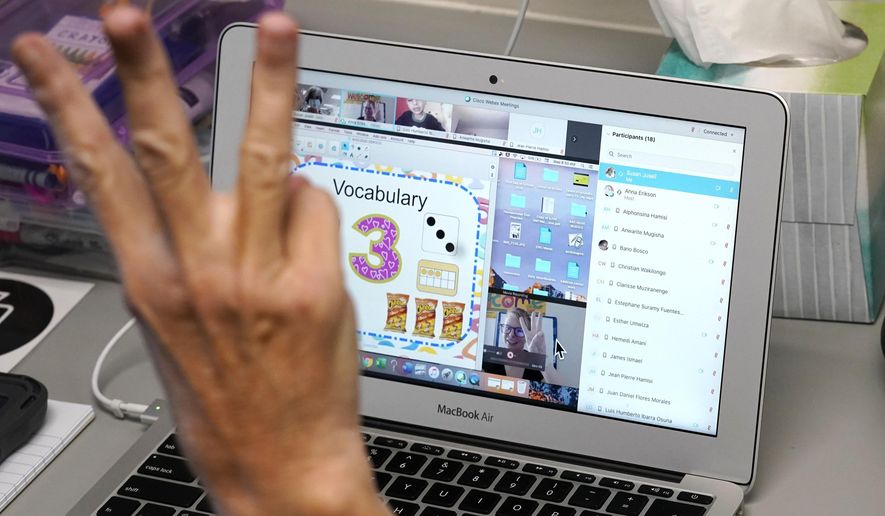Public school systems offering online-only instruction say they are taking steps to protect student confidentiality while recording lessons, addressing privacy concerns among families.
Using online platforms, school staff have a number of ways to protect student privacy, such as limiting access to recordings, muting microphones, turning off video cameras and allowing families to deny permission to record their children.
“The biggest issue that families might need to be concerned about is that Zoom recordings can include the video feeds of participants as well, leading to potential privacy issues stemming from others being able to essentially see into your home if the recording is posted somewhere accessible to others,” said Brad Hayes, chief technology officer for Circadence, a cybersecurity company.
Shayne Wells, a spokesman for D.C. Public Schools said that live lessons are available for playbook for students and that teachers cannot turn on and record a student’s camera and microphone.
“DCPS also uses technology protection to block or filter internet access to visual depictions that are obscene, pornographic, or harmful to minors in compliance with the Children’s Internet Protection Act (CIPA). Content filtering is applied to DCPS-provided devices, but not personal devices,” Mr. Wells said in an email.
Gabrielle Brown, spokeswoman for Prince George’s County Public Schools, says schools are not recording students without their permission, but do monitor the number of devices and who is accessing its software and systems.
The school system uses video-conferencing tools such as Google Meet and Zoom for live or recorded lessons. If teachers record lessons, recordings should exclude students’ faces and voices when possible, Ms. Brown said.
Parents can decide to have their children attend live lessons without their faces showing and without the sound on during lessons, she pointed out, but students cannot opt out of attending live lessons.
In its parent guide to virtual classroom recordings, Montgomery County Public Schools says recordings allow families and students to access the lessons if they cannot view the remote instruction live. MCPS says the recordings are a resource for students who would like to review content from a live lesson.
“Compassion, flexibility, coordinated efforts and a sensible application of existing guidance on student privacy and security have allowed us to provision for these recordings — with certain precautionary measures in place,” the guide says.
Students can access recordings for up to 72 hours after a class ends via their MCPS classroom account. After that time, recordings will be deleted from the Zoom platform. Only students in that class can access the video lesson. Families and students cannot download the video to their computers or storage drives because MCPS has blocked that option.
If a student discipline event or staff misconduct occurs, then a recording may be downloaded by staff and shared with the school’s principal.
When live lessons start, all student microphones are muted and video cameras turned off. MCPS teachers let students know when a recording begins and ends. Students are prompted to consent to a recording in Zoom or else will be kicked out of the class session. Students can interact with teachers through chat without being recorded.
Montgomery County’s school system has set out three preferred ways teachers can record lessons depending on what works best for students and their families.
• Record only the teacher’s live classroom presentation or lesson.
• Pre-record the lesson outside of the live classroom.
• Record the lesson and students during live instruction.
Teachers also have a Spotlight feature in Zoom, which makes the recorded view stay on the teacher. In this option, student voices would be recorded but not their video or chat. Recordings will be solely for educational purposes, MCPS says.
Fairfax County Public Schools says it shares its recordings of its online lessons only with students who are unable to attend class. Teachers post recordings in the Blackboard or Google Classroom platforms that are accessible only to students enrolled in the class, according to FCPS spokeswoman Lucy Caldwell.
Teachers for Arlington County Public Schools record portions of their group instruction such as an introduction to new content or a mini lesson. Video links of the recorded lessons are available to students via Canvas, a password-protected platform.
While Alexandria City Public Schools asks its teachers to record lessons, students are not included in the recordings, said spokeswoman Helen Lloyd. The lessons are posted to a password-protected platform to access.
• Shen Wu Tan can be reached at stan@washingtontimes.com.




Please read our comment policy before commenting.